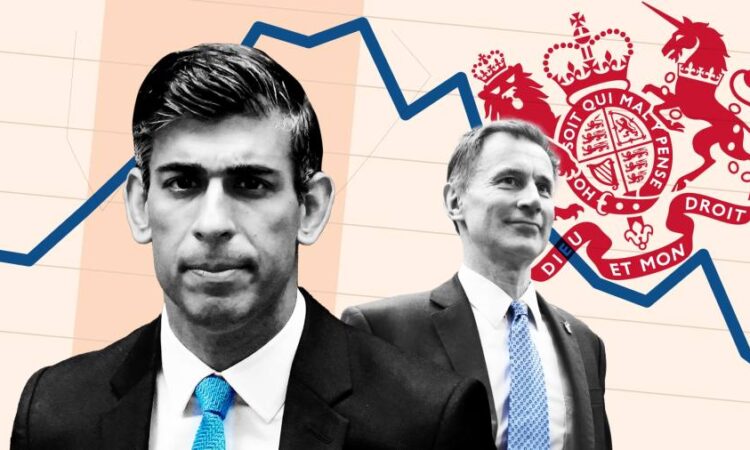
When Jeremy Hunt, the UK’s new chancellor, last week reversed most of the measures in his predecessor’s damaging “mini” Budget, he still faced a gaping hole in the public finances of over £40bn a year.
Plugging this in a Halloween fiscal statement would require “eye-wateringly difficult decisions”, he warned.
But a little over a week later, Hunt’s measures, along with his promises of fiscal prudence and the appointment of a new prime minister, have reassured financial markets and delivered what some in the City have dubbed “the dullness dividend”: lower long-term borrowing costs.
This has allowed prime minister Rishi Sunak and his chancellor to postpone their autumn statement until November 17 without much adverse market reaction.
The delay has also improved the likely outlook for the public finances by enabling the Office for Budget Responsibility, the fiscal watchdog, to factor in cheaper government borrowing costs. The savings will be significant, although they are likely to be under £10bn a year.
But with the cost of servicing government debt far higher than it was at the time of the Spring Statement and a darker economic outlook, none of the decisions taken by the chancellor and the prime minister will be easy.
Sunak and Hunt also have to cope with the fact that spending cuts and tax increases weaken the growth outlook, lowering prospective government revenues. This means that whatever the size of the fiscal hole, the repair job is inevitably larger.

Sunak on Wednesday showed he was willing to take high-risk decisions to plug the gap, leaving open the possibility of ditching the totemic “pensions triple lock” — which guarantees that the state pension rises by at least 2.5 per cent a year, or whichever is higher of earnings growth or inflation — in the hope that the economic outlook will have improved ahead of an election expected in 2024.
Before the new prime minister can think of going to the country, however, he needs to demonstrate he has stabilised the public finances on November 17.
This task will be easier than it would have been had there been an October 31 announcement because the OBR will no longer have to base its forecasts for government debt service costs on the extremely high financial market prices that prevailed in early to mid October.
At that time, Bank of England interest rate expectations jumped, hitting almost 6 per cent on October 10. They are now peaking at just under 5 per cent.
Interest rates on gilts, which set the cost of government borrowing, have also dropped from 4.7 per cent to under 4 per cent on bonds with a maturity of 14 years — the average duration of UK government bonds.
The reduction in the bond yields from their October 10 peak could have improved the public finance outlook by £14bn a year if the OBR had based its initial forecast on that date; however the improvement is expected to be smaller.

Government sources suggested that compared with a black hole of between £35bn and £40bn a year last week, the OBR’s estimate of the fiscal problem would be closer to £30bn a year this week, although ministers had not received any new updates from the fiscal watchdog.
Sunak acknowledged on Wednesday that decisions on taxes and spending would still be “difficult”, even with a smaller public finance hole. Officials are now concerned that each time they propose spending cuts or higher taxes, some of the money saved on paper will soon disappear in worse forecasts for economic performance.
This means that ministers are likely to be advised that they should be seeking savings totalling close to £40bn a year in the autumn statement, still a significant sum.
Some savings options appear certain. The government is highly likely to freeze overseas aid at 0.5 per cent of gross domestic product, rather than raising it to 0.7 per cent as previously planned. This will save £5bn a year.
The appointment of Andrew Mitchell, a champion of higher aid spending, as development minister should limit the risk of any Tory rebellion on the issue. Mitchell has told colleagues that 0.5 per cent of GDP was a realistic target given the circumstances.
Income tax thresholds and allowances will also be targeted. They will be frozen until the end of the five-year forecast period, according to people briefed on Hunt’s thinking, potentially raising £5bn a year by “stealth” as higher inflation drags more people into the income tax system for the first time or propels them into higher bands.
Sunak on Wednesday also left open the possibility that benefits and pensions could increase at less than the rate of inflation next April — a move that could save up to £10bn a year, although he stressed that the “most vulnerable” would be protected.
“I have always acted in a way to protect the most vulnerable, that’s because it is the right thing to do and those are the values of our compassionate party.”
However, protecting the vulnerable would mean savings on the benefits bill would fall well short of £10bn a year.
Other potential big money-savers include lowering the rate of growth of assumed public spending after 2024-2025 when existing plans expire. Reducing spending increases by 1 percentage point could save £13bn a year.
Reducing capital spending could also save up to another £10bn a year, while still retaining expenditure at a higher level in real terms than at any time in the past 30 years.
By stabilising markets, Hunt has bought himself time and will hope that market prices improve further, but the outlook is still much more difficult for the government than it appeared in the spring.
The autumn statement might have been delayed from Halloween, but it is still likely to frighten many voters and Tory MPs when it is delivered next month.






